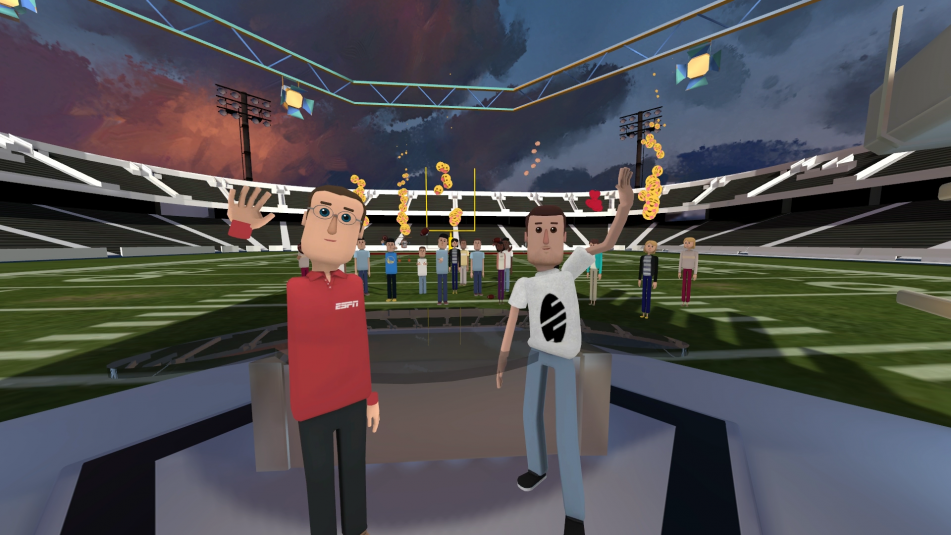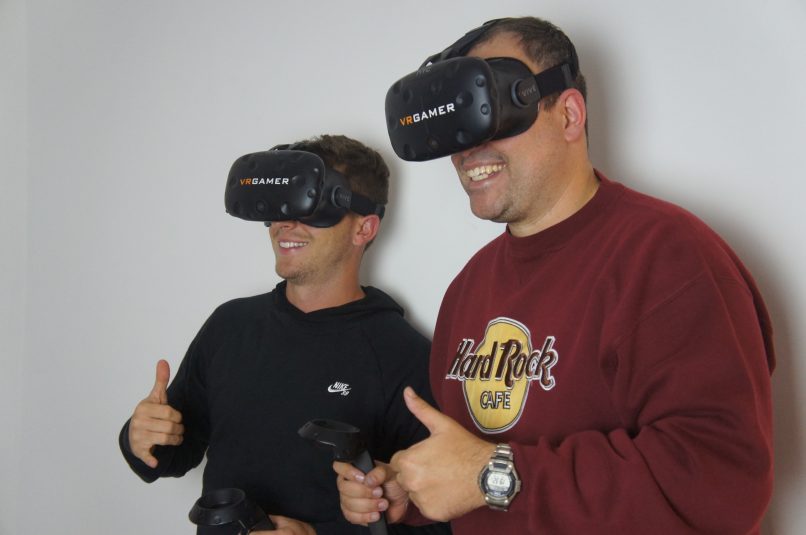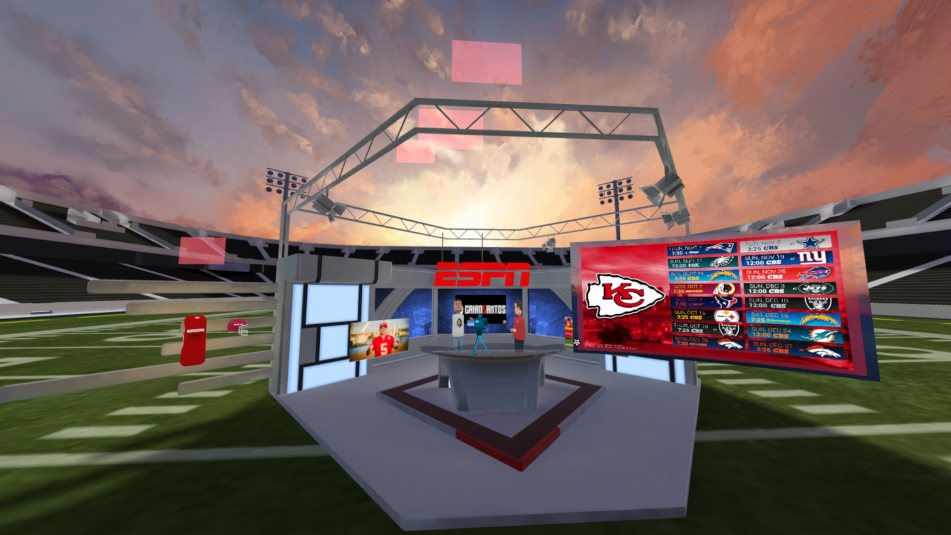ESPN Offers Football Fans a VR Interview With Kansas City Chiefs’ Cairo Santos
Powered by AltspaceVR, the event was also streamed live
Story Highlights
Everyone at Thursday night’s interview with Kansas City Chiefs placekicker Cairo Santos had a front-row seat. That’s because the interview was held in virtual reality (VR), and everyone tuning in with a VR headset had the sensation of being only a few feet away.

Avatars for Kansas City Chiefs placekicker Cairo Santos (right) and ESPN Brazil host Everaldo Marques responded to fans’ questions.
The company behind that VR experience was AltspaceVR, a startup based in Redwood City, CA. The event was born when AltspaceVR got in touch with LX Sports, the agency that represents Santos, to brainstorm about using VR to promote LX’s client base. They soon focused on Santos, a native Brazilian, and then approached ESPN Brazil on hosting an interview.
Although ESPN Brazil had done plenty of work already with Santos, it had never worked in VR, and its executives loved the idea. The companies streamed two interviews, the first in Portuguese and the second in English. Both were 45 minutes long with a short break in between.
“Cairo is a global personality, right?” says Jane Fang, director, business development, AltspaceVR. “He spends time in Kansas City; he probably spends quite a bit of time in Brazil. This was a wonderful opportunity. What a lot of our talent and celebrity see value in is, ‘Hey, I can be anywhere in the world, put on a VR headset, and immediately be face-to-face with fans from all over the world.’”
For the virtual interview, AltspaceVR created an ESPN studio set located in a full-scale football field. Viewers were divided into rooms, but each felt as though they were on the field with Santos. Because there are no limits in VR, the company built in some fun features: fans could wear Chiefs helmets and jerseys and punt footballs around the field.
Although Santos could have conducted the interview from anywhere in the world, he was actually in a local VR studio in Brazil. He and ESPN Brazil host Everaldo Marques wore VR headsets, which offered head-tracking so that their avatars mirrored their head movements. Plus, the software made the avatars’ mouths move when Santos and Marques spoke. The two also held hand controllers so that their avatars would reflect their movements.
When fans wanted to ask a question, they clicked a button on their interface that showed an emoji for Santos and Marques. When called on by either one, the questioner had the mic for 90 seconds to ask a question.
“The great thing is that there are no special cameras or lights or anything like that,” Fang says. “Everything happens in VR.”
AltspaceVR and ESPN worked together to promote the event, reaching out on social platforms and targeting Brazilian media, especially. Fans could tune in by downloading an app to an HTC Vive, Oculus Rift, Samsung Gear VR, or Google Daydream and then creating an account.
Fans who didn’t have a headset weren’t out of luck, though, if they. The interview was streamed in 2D on the ESPN Brazil Facebook page, as well as to some computers and Android phones.

Cairo Santos (left) and Everaldo Marques wore VR headsets that translated their actions to their avatars.
Although the VR-viewing numbers are proprietary to ESPN, Fang notes that the average watch time for VR headsets and computers was between 24 and 30 minutes. It was lower on mobile devices, perhaps because batteries run down. The Facebook stream logged around 2,000 views. AltspaceVR distributes its video globally with Amazon Web Services.
Talking in VR is undeniably cool, but is it a better experience than a group video chat? Fang says the difference is clear: although VR is animated, it offers a face-to-face experience that group video chats don’t. When Santos pointed to a clip on the Jumbotron, for example, everyone in the interview could look at where he was pointing because they were all in the same virtual space. If he were to walk down the field, fans would hear his audio get quieter as he moved farther away.
The interview was AlspaceVR’s first work with a major sports property, and the company is eager to do more. Next time around, the event could be even more involving.
“It went really smoothly, so the next step is how do we make it even more interactive?” Fang says. “What are the things we can do to keep people even more engaged when they’re in VR? If you think about VR and the VR experience compared to watching a YouTube video, you are completely immersed. We have so many possibilities to make good use of that captive attention.”

